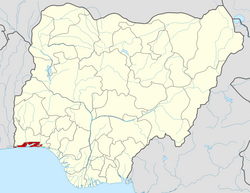Badagry Division is an administrative division of Lagos State in Nigeria. It is one of five administrative divisions of Lagos State (the others being Ikorodu, Ikeja, Epe, and Lagos Island), and is further divided into four Local Government Areas (Badagry, Ojo, Amuwo-Odofin, and Ajeromi-Ifelodun).








